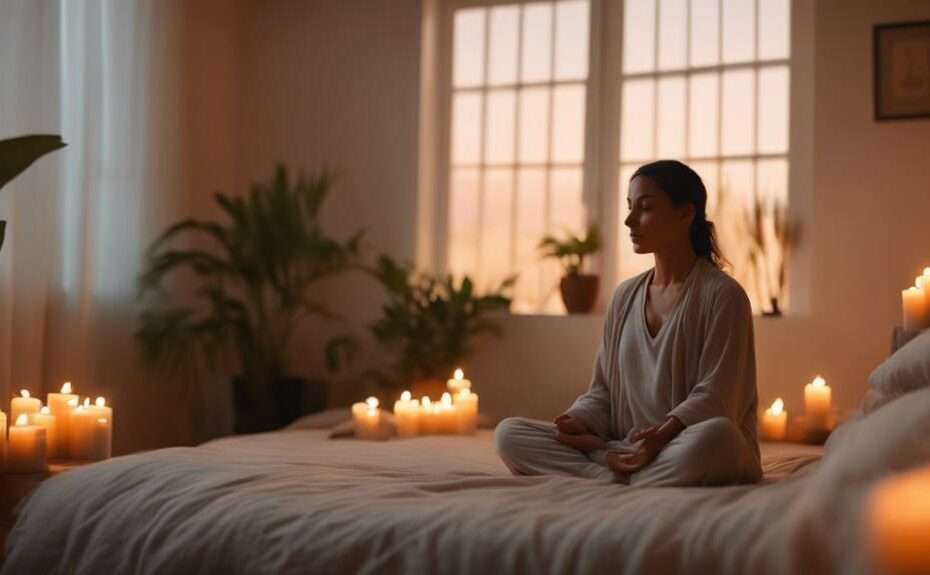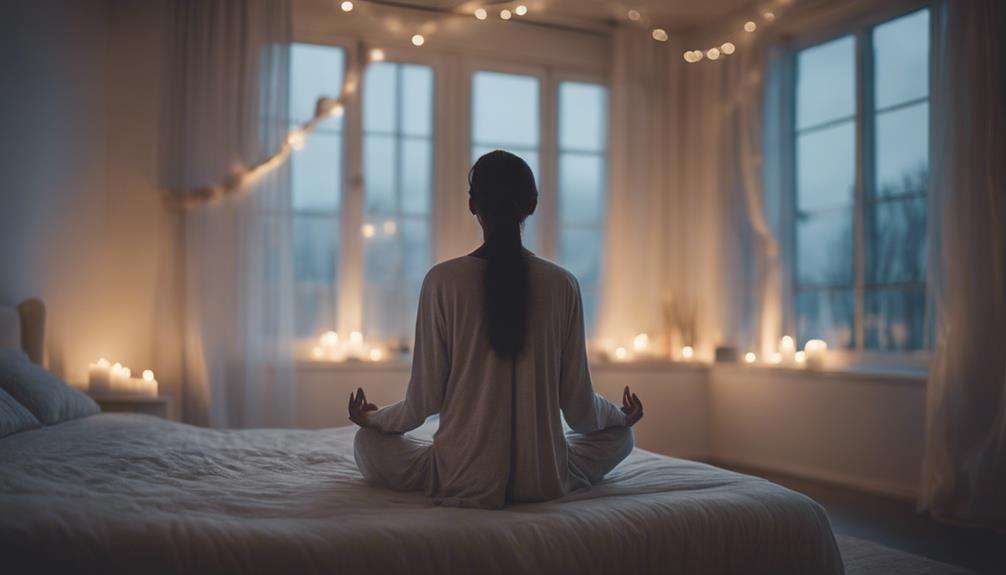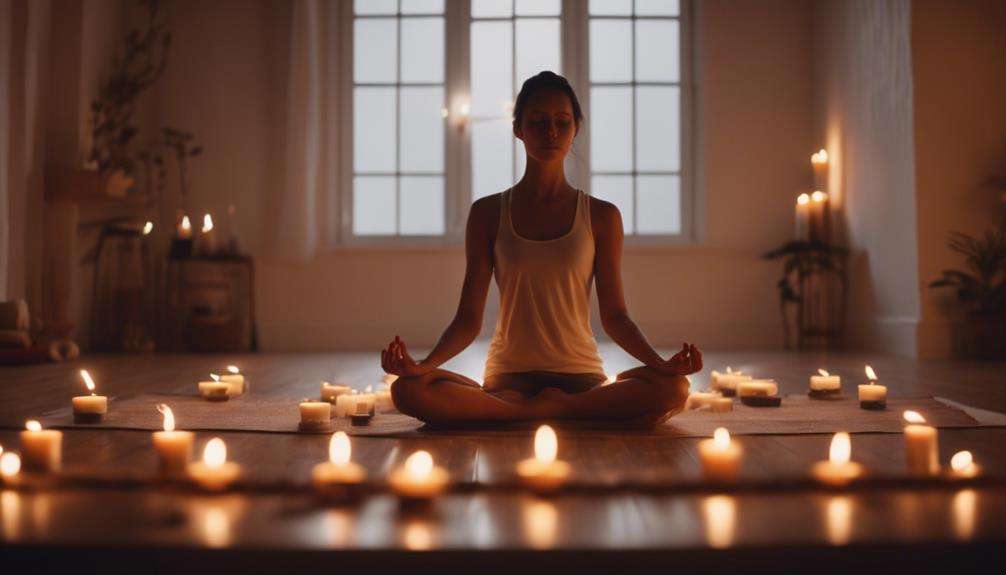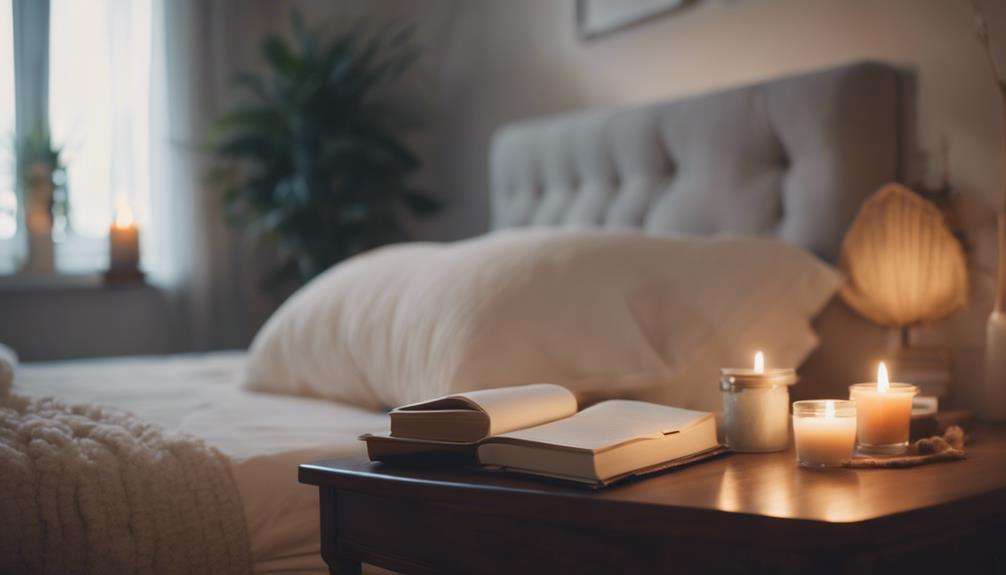Imagine your mind as a turbulent sea that needs calming. Daily meditation practice could be the anchor that steadies those waves.
Have you ever considered how a few moments of mindfulness could transform your sleep? Discover the simple yet profound impact meditation can have on your nightly rest.
Key Takeaways
- Improve sleep quality and reduce insomnia symptoms through daily meditation.
- Enhance relaxation and mindfulness to promote better sleep patterns.
- Reduce stress levels and sleep disturbances for improved sleep duration.
- Cultivate deep relaxation and body awareness to enhance overall sleep experience.
Benefits of Daily Meditation for Sleep
Improve your sleep quality and reduce insomnia symptoms through the daily practice of meditation. By incorporating meditation into your routine, you can experience the benefits of enhanced mindfulness and relaxation, leading to a calmer mind before bedtime. Studies have shown that regular meditation not only reduces stress but also promotes better sleep patterns by increasing awareness and mindfulness. This can result in decreased sleep disturbances and improved overall sleep duration.
Engaging in consistent meditation practices can help in reducing sleep onset latency, making it easier for you to fall asleep. Additionally, it can enhance your sleep efficiency, ensuring that the time you spend asleep is more restful and rejuvenating. By dedicating time each day to meditation, you're prioritizing your sleep health and overall well-being. Through this simple yet powerful practice, you can create a bedtime routine that sets the stage for a peaceful night's rest.
Mindfulness Meditation Techniques for Better Sleep
If you're seeking better sleep through mindfulness meditation techniques, focusing on deep breathing for relaxation and practicing the body scan technique can be beneficial.
By centering your attention on your breath and systematically scanning your body for tension, you can help promote relaxation and prepare your mind for restful sleep.
These techniques aim to enhance your awareness, reduce stress, and create the ideal conditions for a peaceful night's sleep.
Breathing for Relaxation
Incorporating mindful breathing techniques into your bedtime routine can significantly enhance your ability to relax and improve your overall sleep quality. Here's how mindful breathing can help you achieve better sleep:
- Promotes Relaxation: Deep breathing in mindfulness meditation aids in reducing stress and promoting relaxation.
- Calms Racing Thoughts: Focusing on your breath helps calm the mind, reducing racing thoughts that can interfere with sleep.
- Enhances Sleep Quality: Mindful breathing techniques induce a state of calmness, leading to improved sleep quality.
- Aids in Sleep Onset: Practicing mindfulness meditation before bed can help you fall asleep faster and enjoy a more restful night.
Body Scan Technique
To enhance your nightly relaxation and improve the quality of your sleep, consider incorporating the Body Scan Technique into your mindfulness meditation routine. Body scan meditation involves systematically focusing on and relaxing different body parts, helping release tension and stress, promoting relaxation and calmness.
By paying attention to physical sensations, it enhances awareness and reduces racing thoughts that can interfere with sleep. Practicing body scan meditation regularly before bed can improve sleep quality, inducing a state of relaxation conducive to falling asleep.
Research supports body scan meditation as an effective tool for managing sleep disturbances and promoting better overall sleep patterns. Embrace this technique to unwind, alleviate stress, and enhance your sleep experience.
Guided Meditation Practices for Improved Sleep Quality

Wondering how guided meditation practices can enhance the quality of your sleep? Here's how they can help:
- Mindfulness: Guided meditations cultivate mindfulness, allowing you to focus on the present moment and quiet the mind before sleep.
- Relaxation: These practices promote deep relaxation by guiding you through calming visualizations and body relaxation techniques.
- Self-Compassion: Guided meditations encourage self-compassion, easing any self-criticism or worries that may interfere with your sleep.
- Stress Reduction: By incorporating breath work and awareness exercises, guided meditation helps reduce stress levels, making it easier to unwind and fall asleep peacefully.
Engaging in guided meditation for sleep improvement involves a structured approach that lasts around 20 minutes, emphasizing nonjudgmental awareness and physical sensation awareness.
Regular practice of these techniques has been shown to effectively enhance sleep quality over time. So, why not give guided meditation a try tonight to experience its benefits firsthand?
Body Scan Meditation and Sleep Enhancement
Feeling restless before bed?
Body scan meditation offers a powerful tool to unwind and connect with your body.
By systematically focusing on each body part, you can release tension and pave the way for a peaceful night's sleep.
Give it a try tonight for a more relaxed and restful slumber.
Mind-Body Connection
Enhance your sleep quality through the powerful practice of body scan meditation, fostering a deeper mind-body connection for improved relaxation and awareness. Body scan meditation focuses on body awareness and physical sensations, aiding in tension release and relaxation.
Here's how it can help you achieve better sleep:
- Increased awareness of body parts.
- Recognition and release of physical tension.
- Enhanced relaxation through focused attention.
- Improved sleep quality by calming the mind and body.
Research suggests that practicing body scan meditation can positively impact sleep patterns and induce a state of deep relaxation, making it a valuable tool for enhancing your overall sleep experience.
Relaxation for Sleep
To improve your sleep quality through relaxation, consider incorporating body scan meditation into your bedtime routine for enhanced awareness and tension release. Body scan meditation involves focusing on each body part systematically, promoting relaxation and heightened awareness of physical sensations. This practice aids in releasing tension, calming the mind, and enhancing sleep quality by increasing bodily awareness.
Research indicates that body scan meditation is effective in reducing stress, anxiety, and symptoms of insomnia. By practicing body scan meditation regularly before sleep, you can prepare your body and mind for a restful night. This mindfulness technique fosters relaxation, potentially leading to better sleep initiation and overall sleep enhancement.
Make body scan meditation a part of your nightly routine to experience its stress-relieving and sleep-promoting benefits.
Incorporating Qigong for Restful Sleep

Incorporate Qigong into your nightly routine for a restful and rejuvenating sleep experience. Qigong, a mind-body practice, focuses on promoting relaxation, reducing stress, and enhancing sleep quality through gentle movements, breathing techniques, and meditation.
Here are four ways Qigong can help you achieve better sleep:
- Stress Reduction: By practicing Qigong before bedtime, you can lower stress levels and calm your mind, creating an ideal state for peaceful sleep.
- Improved Sleep Quality: Regular Qigong sessions can help regulate your body's energy flow, leading to better sleep patterns and reduced disturbances during the night.
- Inner Peace: Qigong aids in releasing physical tension and fostering a sense of inner peace essential for falling asleep easily and deeply.
- Nightly Routine: Incorporating Qigong into your nightly routine signals to your body that it's time to unwind, helping you transition smoothly into a restful sleep.
Tai Chi for Relaxation and Better Sleep
For a more restful night's sleep, consider incorporating Tai Chi into your daily routine. Tai Chi, a gentle mind-body exercise rooted in ancient Chinese martial arts, has been proven to enhance sleep quality and alleviate insomnia symptoms. The slow, flowing movements of Tai Chi, combined with deep breathing and relaxation techniques, promote a state of calmness and relaxation that can significantly reduce stress levels. By engaging in regular Tai Chi practice, you can experience improved sleep patterns, increased melatonin levels, and better overall sleep efficiency.
The practice of Tai Chi isn't only beneficial for physical health but also for mental well-being. Its focus on mindfulness and gentle movements helps in reducing stress and anxiety, making it an effective tool for achieving better sleep. By incorporating Tai Chi into your daily routine, you can reap the benefits of this holistic practice, leading to a more relaxed mind and body conducive to a peaceful night's rest.
Yoga Nidra: A Path to Deeper Sleep
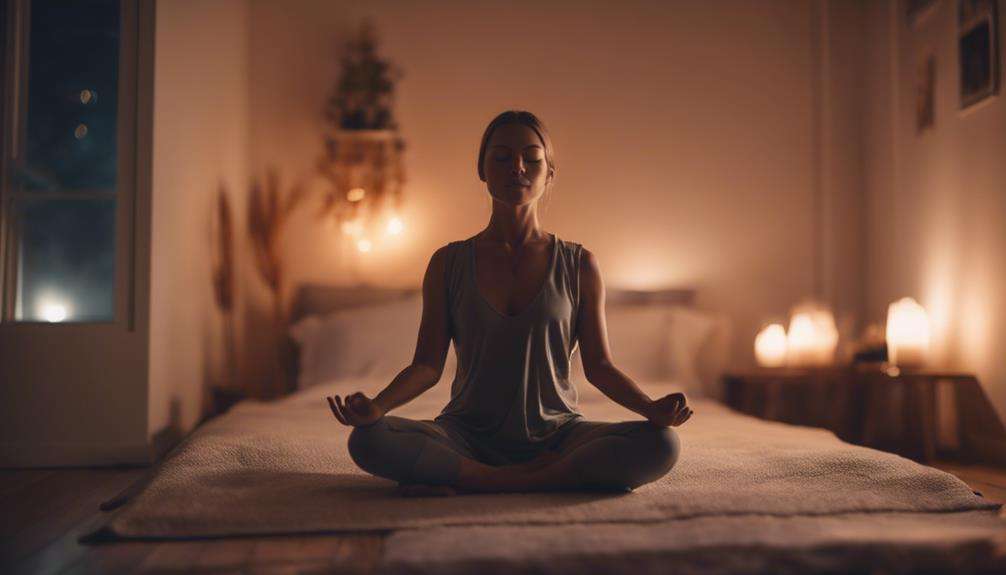
Experience a path to deeper and more restful sleep with the transformative practice of Yoga Nidra. This guided meditation technique offers a unique approach to achieving profound relaxation and enhancing sleep quality.
Here's why Yoga Nidra can help you achieve better sleep:
- Conscious Sleep: Yoga Nidra induces a conscious sleep-like state, allowing you to relax deeply while remaining aware.
- Stress Reduction: By engaging in systematic body scanning and breath awareness, this practice helps reduce stress and anxiety levels.
- Enhanced Relaxation: Through visualization techniques, Yoga Nidra calms the mind and body, preparing you for a peaceful night's sleep.
- Melatonin Levels: Regular practice of Yoga Nidra has been linked to increased melatonin levels, aiding in better sleep onset and overall sleep efficiency.
Meditation Routine for Evening Relaxation
Discover the calming benefits of establishing a meditation routine in the evening for enhanced relaxation before bedtime. Engaging in a consistent meditation practice before sleep can significantly aid in stress reduction and improve your overall sleep quality. By dedicating time to meditation as part of your bedtime preparation, you signal to your body that it's time to unwind and prepare for rest. Research suggests that mindful meditation before sleep can help alleviate insomnia symptoms and promote better sleep patterns.
Incorporating a meditation routine for evening relaxation doesn't have to be complicated. Find a quiet, comfortable space where you can sit or lie down without distractions. Focus on your breath, allowing yourself to let go of the day's worries and stresses. As you practice this relaxation before sleep, you create a peaceful transition to bedtime, enhancing your chances of falling asleep more easily and enjoying a restful night.
Enhancing Sleep Through Mindful Movement
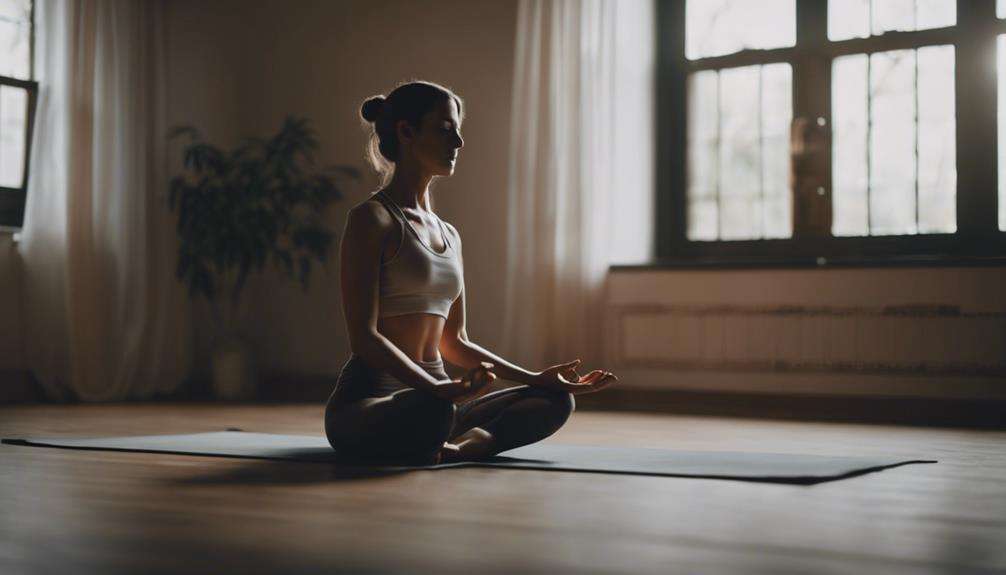
Prepare your body and mind for a restful night's sleep by incorporating mindful movement practices like yoga and gentle stretching into your bedtime routine. Engaging in these activities can significantly enhance your sleep quality by promoting relaxation and stress relief. Here's how mindful movement can help you achieve better sleep:
- Relaxing the Body:
Yoga and gentle stretching before bed can help release tension accumulated during the day, allowing your body to unwind and prepare for sleep.
- Calming the Mind:
Mindful movement practices like tai chi or walking can help calm your mind, reducing racing thoughts and promoting mental relaxation.
- Stress Relief:
Incorporating movement into your bedtime routine can aid in stress relief, allowing you to let go of worries and anxieties that may interfere with sleep.
- Improving Sleep Quality:
Frequently Asked Questions
Can Meditation Make You Sleep Better?
Yes, meditation can make you sleep better by improving sleep quality, calming your mind, reducing stress, and incorporating mindfulness practices. Relaxation techniques like deep breathing help promote a restful night's sleep, enhancing overall well-being.
Can Meditation Replace Sleep Entirely?
Meditation benefits are vast, but they can't replace sleep entirely. Sleep deprivation harms your health. Meditation techniques enhance sleep quality, promote mindful relaxation, and help regulate sleep patterns. Combining both practices ensures better overall well-being.
How Do You Meditate to Promote Sleep?
To promote sleep through meditation, start with deep relaxation techniques. Engage in mind-body connection, guided imagery, and breathing exercises. These practices relieve stress, establish a bedtime routine, and calm your mind for a restful night's sleep.
What Happens When You Start Meditating Everyday?
When you start meditating every day, benefits like reduced stress, improved sleep quality, enhanced mindfulness, and clearer mental focus can be experienced. Your sleep patterns may become more regulated, leading to a more restful night.
Conclusion
You now hold the key to unlocking the ultimate secret to achieving heavenly sleep every night.
With the power of daily meditation, you can transform your restless nights into a tranquil oasis of deep relaxation and rejuvenation.
Embrace the practice, breathe in serenity, and drift off into a world of peaceful slumber like never before.
Say goodbye to sleepless nights and hello to a blissful journey to dreamland every night.
Sweet dreams await you, so let meditation be your guide.
